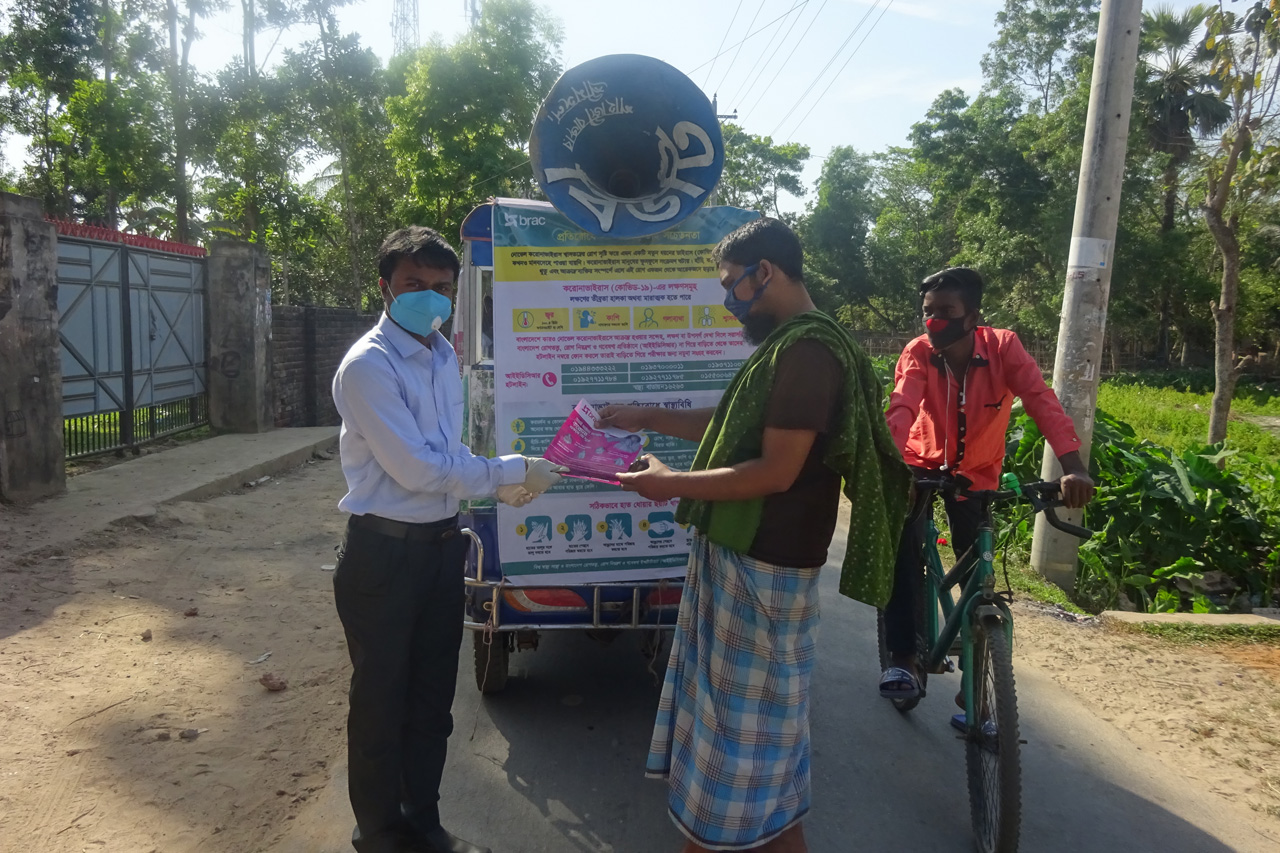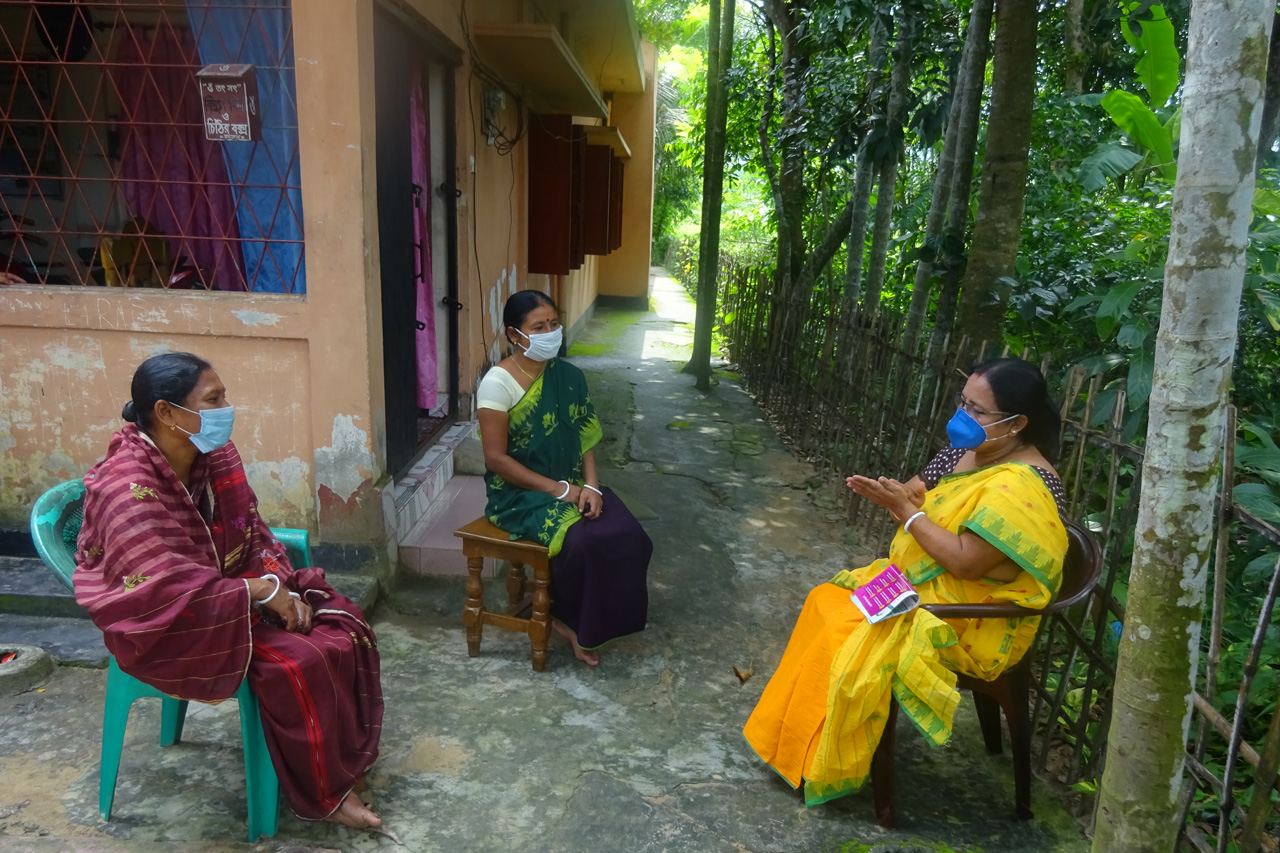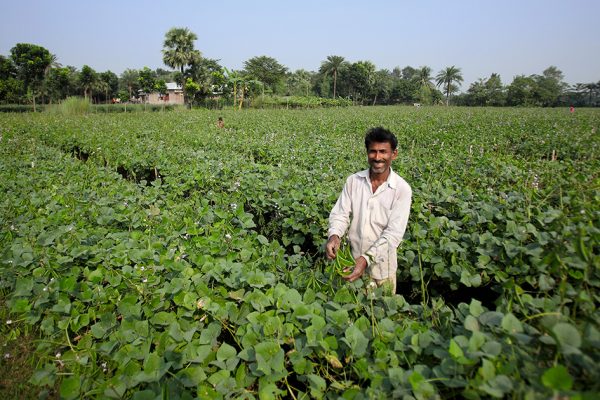Village cooperatives addressing COVID-19: Stories from the gas-field regions of greater Sylhet
Reading Time: 3 minutes
Cooperative societies are the major wheel turners of the rural economy in Bangladesh. With 3,998 members, 110 village development organisations have been established around the gas-field areas of Sylhet, Moulvibazar and Habiganj districts of Bangladesh. These cooperatives, formed to enhance the socio-economic conditions of its members, are registered with the government’s Department of Cooperatives, supported by the Jibika project in collaboration with BRAC and Chevron.
COVID-19 is beyond a public health emergency in Bangladesh, where a majority of people are employed in informal sectors. With restrictions across the country, these people were hit the hardest. Members of rural cooperatives were no different – most earn their living through farming, small ventures and other daily endeavours.
Members of Jibika’s 110 village development organisations feared loss of livelihood, starvation and death. However, after a year, the following are their realities:
- Average monthly household income reached 92% of pre-pandemic levels in February 2021, from 47% in April 2020
- The organisations’ funds increased by 11% compared to the previous year
- Savings deposits by members saw 39% growth and the organisations’ share capital rose by 22%, compared to the previous year
- Seven organisations were recognised as the best performing cooperatives under the category of Sarbik Gram Unnayan (overall village development) by the Department of Cooperatives at the 49th National Cooperative Day in November 2020
- Low number of COVID-19 cases amongst members
How was all this possible? Through joint efforts from the village development organisation members and the Jibika project.

COVID-19 precaution messages were spread through loudspeakers, leaflets, stickers as well as practical demonstrations on health protocol maintenance.
Awareness and guidance
With the detection of the first COVID-19 patient in Bangladesh, Jibika focused on building their staff’s capacity and running awareness campaigns on COVID-19 in the project areas. Safety precaution messages were spread through loudspeakers, leaflets, stickers as well as practical demonstrations on health protocol maintenance. Field staff were in continuous communication with the village development organisation members, remotely guiding and assuring them, and trying to restore their hope during such uncertain times.
Read more: Revitalising livelihoods through self-help groups
Community mobilisation by members
Realising the gravity of the situation, some members quickly emerged as community heroes, reaching out to their neighbourhoods equipped with the knowledge and materials obtained from the project.
“I can only be safe when people around me are safe. I need to do this to protect my community,” said Niyoti, the secretary of Noyagao VDO under the Jibika project, who went door to door to explain the importance of washing hands, wearing masks and maintaining social distance. Five Jibika village organisations distributed food and hygiene items from their own funds to 184 people creating unique examples of humanity and leadership.
Observing the difficulties in understanding Bangla messages in the Monipuri indigenous community, Shubhra, the Secretary of Uttar Baligao VDO started sharing COVID-19 precautionary messages in the Bishnupriya dialect.

Handwashing booths at a VDO office as part of safety precautions against COVID-19
Emphasis on COVID-19 precaution during organisation activities
After the initial lockdown, endeavours to resume economic activities were inevitable despite lingering threats of COVID-19. To balance between life and livelihood, the project focused on resuming activities maintaining proper health protocols.
Hand-washing booths, infrared thermometers, and masks were placed in every village organisation office to ensure health and safety at work. Training resumed, whilst ensuring safety precautions, and meetings were conducted in small groups while maintaining social distancing.

Temperature screening by trained VDO member before entering the premises, as part of safety precautions against COVID-19
Read more: Annual General Meetings in the most unexpected places
Flexible loan policies
As per the government’s guidelines, village development organisations’ loan collection was paused till June 2020. Moreover, the collection timeline was extended to three more months without any additional fees. Nevertheless, the organisations continued loan disbursement during this period and the members already paying installments were encouraged to repay their remaining amount within the revised timeline to get bigger loans.
Additional support to boost livelihoods
Despite regular activities, focused interventions to uplift income were needed to recover from the economic damage. Hence, COVID-19 support initiatives were launched for faster growth and sustainability. After need-assessments and feedback from the organisations, eight kinds of assets were distributed to boost earnings. These included rickshaws, rice threshers, power sprayers, power tillers, water pumps, rice reapers, livestock and sewing machines.

Shubhra, the Secretary of Uttar Baligao VDO, sharing safety precaution messages in the Bishnupriya dialect to her Monipuri indigenous community
A fixed budget was allocated from the project to procure the assets. When the assets needed greater investments, the organisations paid the excess amount from their funds. These items are the properties of the organisations leased to the members under profit-sharing agreements. 70% of these are currently in use to generate income.
Along with creating employment for the members and the community, this is an added revenue stream for the organisations, reducing their dependency on loan collection. Furthermore, 3,654 high-quality mango and guava trees were planted in 75 of the village development organisations for long-term yield under Chevron’s tree plantation drive.
Every person can change their circumstances, given the appropriate support. Jibika, a collaborative initiative of Chevron and BRAC and its local implementing partner IDEA, was launched in 2015 to support communities living around the Chevron-operated gas field areas. Currently, the project is aiming for the sustainability of the 110 organisations, focusing on members’ capacity development, VDOs’ governance and income growth. Presently, around 20,000 people are being supported by the project.
Tasnima Iqbal is Manager, Communication and Outreach, Jibika Project, Integrated Development Programme (IDP).
Jibika is a collaborative project of BRAC and Chevron which focuses on uplifting the socioeconomic condition of communities living near Chevron-operated gas fields in greater Sylhet. Following successful completion of phase I, Jibika phase II started in May 2019 and will continue till April 2022. The project is being implemented by BRAC and its implementing partner IDEA and supported by Chevron. This project is under BRAC’s Integrated Development Programme (IDP) working to enhance the socioeconomic condition of people in remote areas of Bangladesh.





